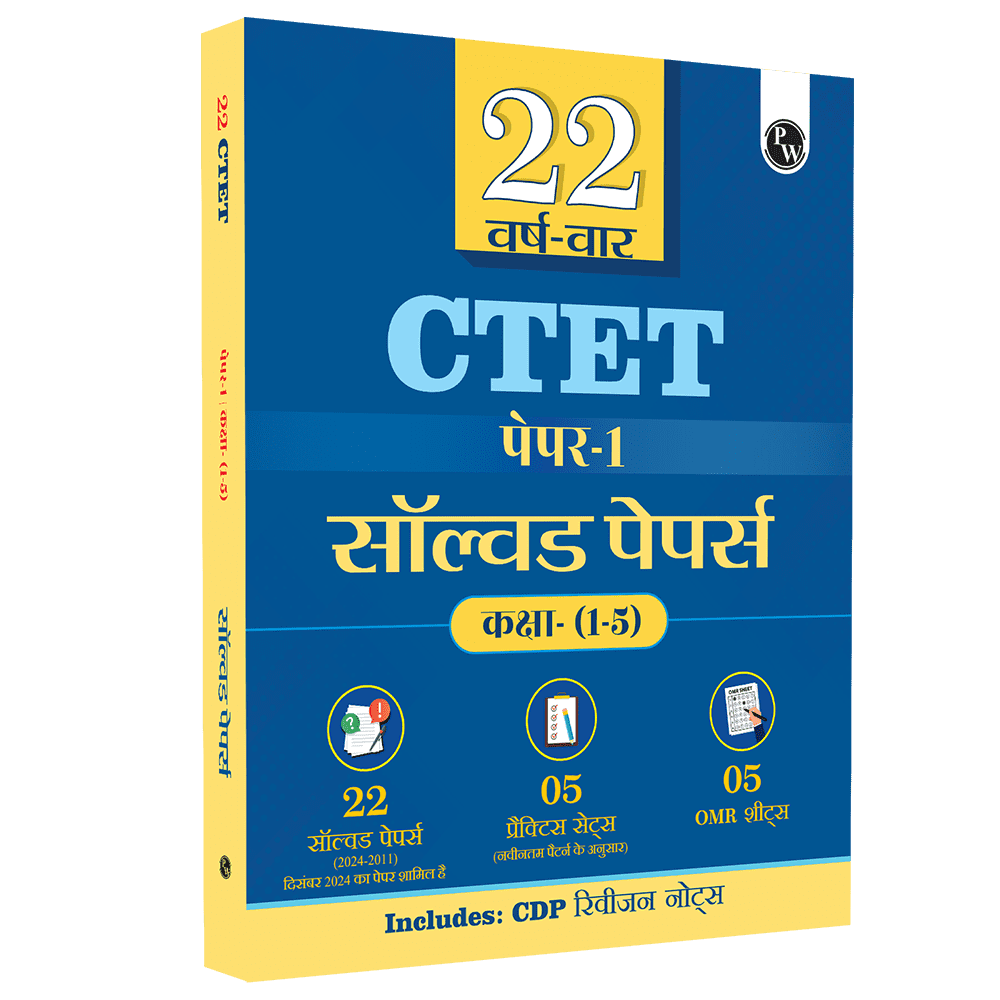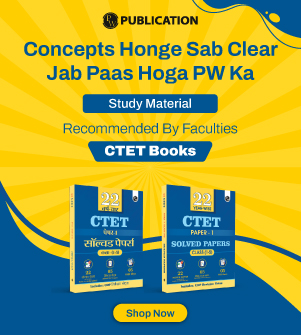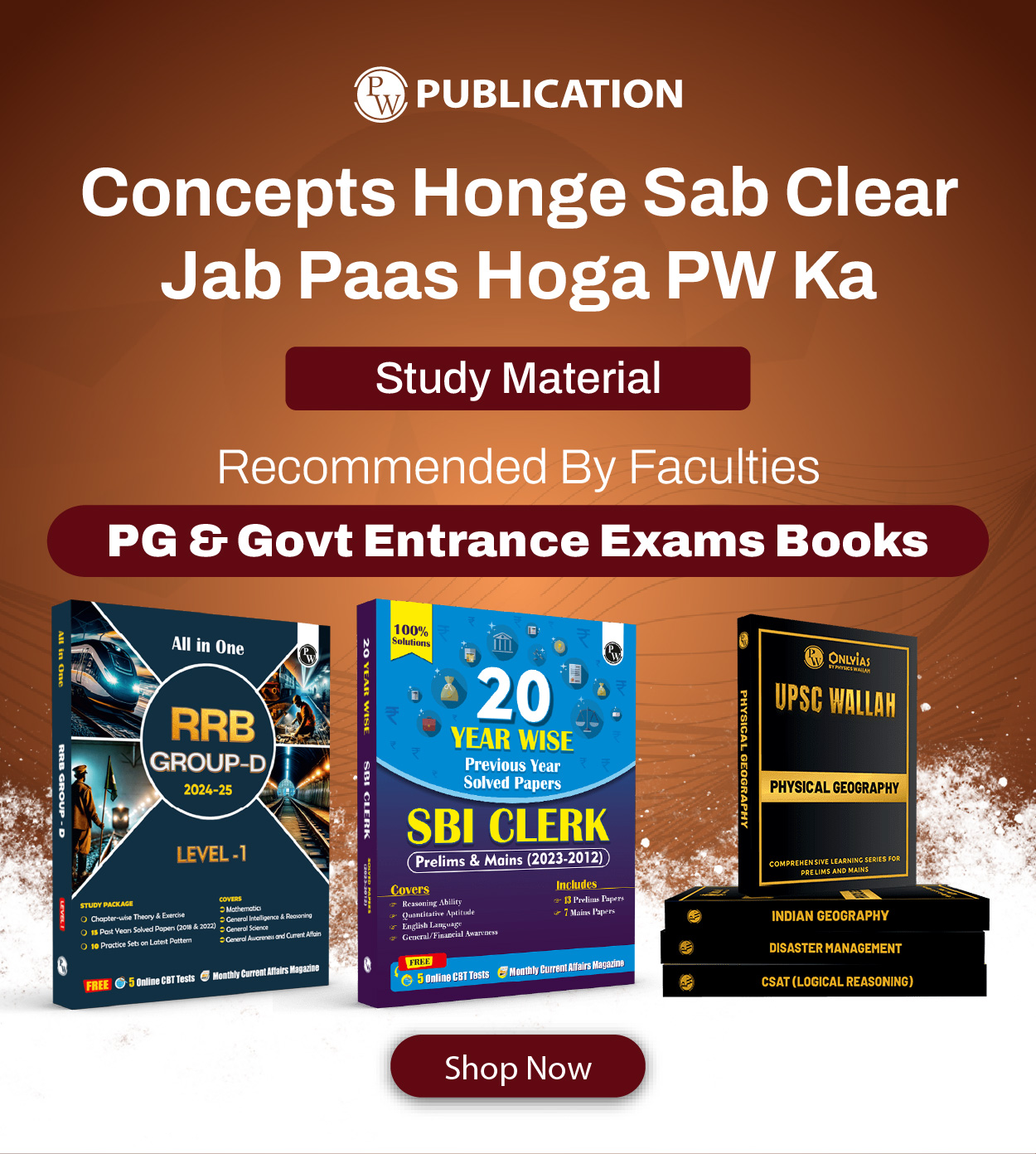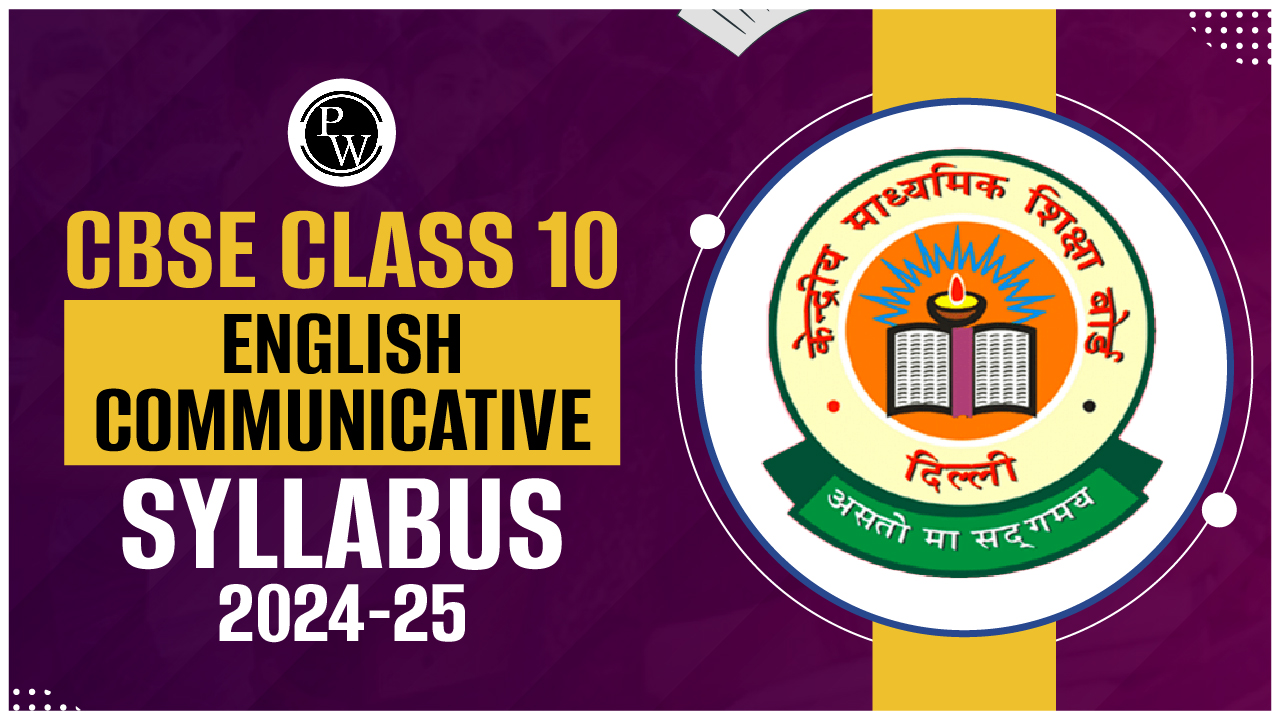List of Important Topics for CTET Exams
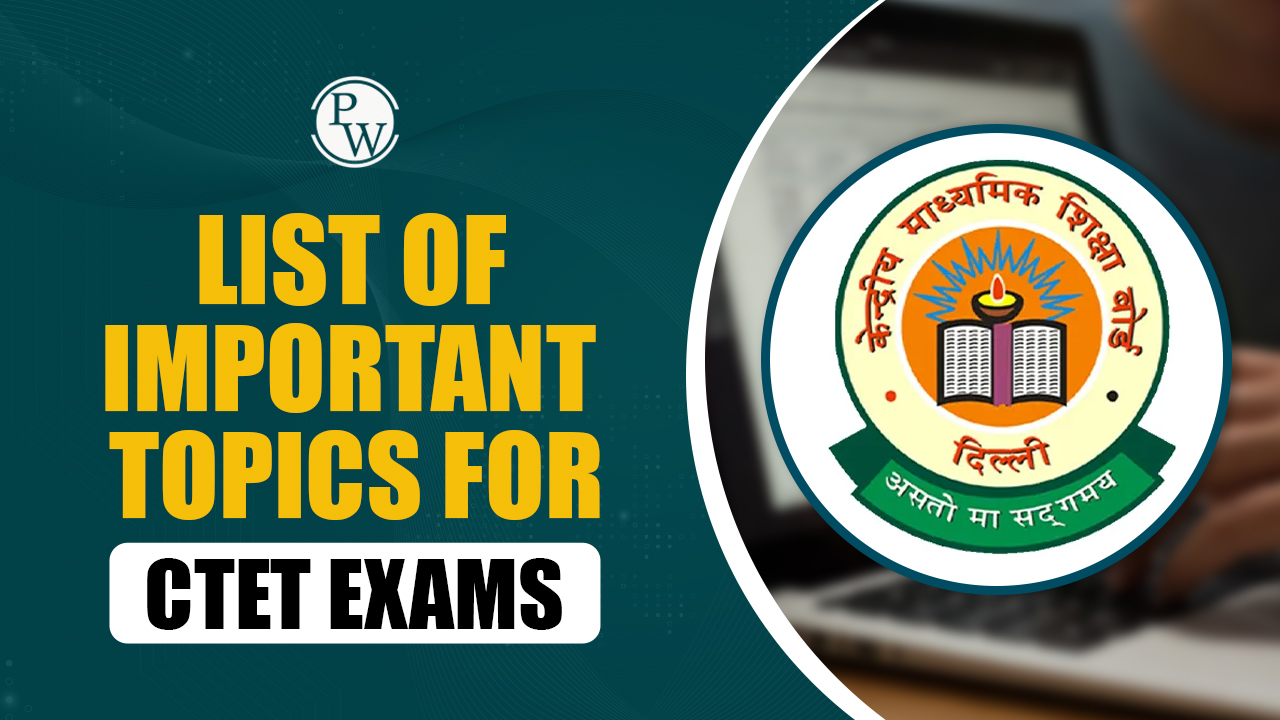
List of Important Topics for CTET Exams: Are you preparing to become a teacher? The Central Teacher Eligibility Test (CTET) is your first step toward teaching in government schools. This exam tests your skills and knowledge about teaching children from Class 1 to 8. Many students struggle to determine what to study. We will help you understand the important topics from the CTET lists that you need to focus on. We will discuss topics in detail and subject-wise requirements with some tips and strategies that you will need to crack the exam.
Check Out: CTET Books
CTET Most Important Topics
Before learning about important topics, we should learn about the CTET exam. The exam has two papers:
- Paper 1: For teachers who want to teach classes 1 to 5
- Paper 2: For teachers who want to teach classes 6 to 8
If you want to teach all classes from 1 to 8, you need to take both papers.
CTET Exam Structure 2025
Before we talk about CTET's most important topics, let's understand how the exam works.
CTET Paper 1 Structure
- Total Questions: 150
- Total Marks: 150
- Time: 2 hours 30 minutes
- Type: Multiple choice questions
- Subjects: 5 sections
CTET Paper 2 Structure
- Total Questions: 150
- Total Marks: 150
- Time: 2 hours 30 minutes
- Type: Multiple choice questions
- Subjects: 4 sections
Both papers are offline exams. You get 1 mark for each right answer. There is no negative marking, so you don't lose marks for wrong answers.
Check Out: CTET Paper 1 - 22 Solved Papers 2024 - 2011
CTET Important Topics for Paper 1
Let's look at the CTET important topics for each subject in Paper 1:
1. Child Development and Pedagogy (30 Questions)
This section is very important for CTET exam preparation. It covers how children learn and grow.
Key Topics:
- How children develop from age 6 to 11
- How children learn new things
- Different ways children think and solve problems
- How to teach children with special needs
- Understanding children who learn differently
- How to make learning fun and easy
- Ways to check if children are learning well
Important Subtopics:
- Piaget's theory of child development
- Vygotsky's social learning theory
- Multiple Intelligences Theory
- Learning disabilities and how to help
- Motivation and how it affects learning
- Assessment methods for young children
2. Language I (30 Questions)
Language I is usually Hindi or English. This section tests your reading skills and teaching methods.
Key Topics:
- Reading comprehension (understanding what you read)
- Grammar and language rules
- How to teach language to children
- Listening and speaking skills
- Writing skills development
- Using stories and poems in teaching
Important Areas:
- Reading two passages and answering questions
- Understanding the main idea of a text
- Finding specific information from passages
- Teaching methods for language learning
- How children learn their first language
- Dealing with language problems in class
3. Language-II (30 Questions)
This is your second language. The format is the same as Language-I.
Key Topics:
- Reading comprehension
- Grammar and vocabulary
- Teaching methods for a second language
- Cultural aspects of language
- Translation skills
- Literature appreciation
4. Mathematics (30 Questions)
Math is often challenging for many candidates. Focus on these CTET most important topics:
Content Areas (20 Questions):
- Numbers and number systems
- Addition, subtraction, multiplication, division
- Fractions and decimals
- Geometry and shapes
- Measurement (length, weight, time, money)
- Data handling and simple graphs
Teaching Methods (10 Questions):
- How to make math easy for children
- Using games and activities in math teaching
- Solving math problems step by step
- Common mistakes children make in math
- How to check if children understand math concepts
5. Environmental Studies (30 Questions)
This subject combines science and social studies for young children.
Key Topics:
- Family and relationships
- Food and nutrition
- Water and its importance
- Housing and shelter
- Travel and transport
- Plants and animals around us
- Our community helpers
- Festivals and celebrations
Teaching Methods:
- Learning through activities and experiments
- Field trips and outdoor learning
- Using the local environment for teaching
- Making EVS interesting for children
Read More: CTET Previous Year Question Papers with Solutions
CTET Important Topics for Paper 2
Paper 2 has four sections instead of five. Here are the CTET important topics:
1. Child Development and Pedagogy (30 Questions)
This section is the same for both papers but focuses on older children (11-14 years).
Key Topics:
- How teenagers develop and change
- Learning styles of older children
- Classroom management for secondary classes
- Dealing with discipline issues
- Motivation for teenage students
- Assessment and evaluation methods
2. Language I and Language II (30 Questions Each)
The language sections are similar to Paper 1 but with harder passages and more complex grammar.
3. Mathematics and Science OR Social Studies (60 Questions)
You can choose either Math & Science or Social Studies based on what you want to teach.
Mathematics and Science (for Math/Science Teachers)
Mathematics Topics:
- Number system and integers
- Algebra basics
- Geometry and mensuration
- Statistics and probability
- Ratio, proportion, and percentage
Science Topics:
- Food and nutrition science
- Materials and their properties
- Light, sound, and motion
- Natural resources and environment
- Basic chemistry and physics concepts
Social Studies (for Social Science Teachers)
History Topics:
- Ancient India
- Medieval India
- Modern India and the freedom struggle
- World history basics
Geography Topics:
- Physical features of India
- Climate and weather
- Natural resources
- Population and settlements
Civics Topics:
- Indian Constitution basics
- Government and democracy
- Rights and duties
- Social issues and solutions
Check Out: CTET Paper 1 - 22 Solved Papers 2024 - 2011 in Hindi
How to Use CTET Previous Year Question Papers
CTET PYQ (previous year questions) are very helpful for preparation. Here's how to use them:
1. Practice Regularly: Solve the CTET previous year question paper at least twice a week
2. Time Management: Practice finishing papers in the given time
3. Identify Patterns: See which topics come up most often
4. Check Your Weak Areas: Find subjects where you make more mistakes
5. Learn from Mistakes: Understand why you got questions wrong
CTET previous year paper analysis shows that some topics repeat more often:
- Child psychology and development theories
- Reading comprehension in languages
- Basic math concepts and problem-solving
- Environmental awareness and teaching methods
Smart Study Tips for CTET Preparation
1. Make a Study Plan
Study for 3-4 hours daily and give more time to your weak subjects. Take breaks every hour and review what you learned each week.
2. Use Simple Study Methods
Make short notes for quick revision. Use diagrams and charts for better memory. Practice writing answers in simple language. Teach concepts to friends or family.
3. Focus on Understanding, Not Memory
Don't just memorize facts. Understand why things work the way they do. Connect new learning to what you already know. Ask yourself questions while studying.
4. Practice Mock Tests
Take practice tests every week. Try to finish in the given time and check your answers carefully. Keep track of your scores to see improvement.
Last-Minute Preparation Tips
If your exam is near, focus on these CTET most important topics:
1. Child Development Theories: Learn the main ideas of Piaget, Vygotsky, and Gardner
2. Language Comprehension: Practice reading passages quickly and accurately
3. Basic Math Concepts: Review number operations, geometry, and problem-solving
4. Environmental Studies: Focus on family, food, water, and community topics
5. Current Education Policies: Know about NEP 2020 and inclusive education
Success in CTET comes from understanding the important CTET topics and practicing regularly. Don't try to study everything at once. Focus on the main topics we discussed in this guide. Use CTET PYQs to practice and improve your speed and accuracy.
Remember, CTET is not just about getting a certificate. It prepares you to be a good teacher who can help children learn and grow. Study with the goal of becoming the kind of teacher every child deserves. Start your CTET exam preparation today with a clear plan. Focus on understanding concepts rather than just memorizing facts. Practice with the CTET previous year question paper regularly, and you'll be ready to pass the exam and start your teaching career.
Read More: Last Minute Study Material for CTET Exam 2025
CTET Important Topics FAQs
Q1. What are the most important topics in CTET Paper 1?
A: Key topics in CTET Paper 1 include Child Development and Pedagogy, Language I & II, Mathematics, and Environmental Studies. Focus on learning theories, grammar, comprehension, number systems, and EVS concepts.
Q2. Are NCERT books sufficient for CTET preparation?
A: Yes, NCERT books (especially Classes 1–8) are highly recommended for CTET. They cover all important topics in Mathematics, EVS, and Language sections.
Q3. What are the scoring topics in CTET Paper 2 Mathematics and Science?
A: Focus on Number Systems, Algebra, Geometry, Mensuration, Life Sciences, Physics basics, and Chemistry. Pedagogical issues in teaching these subjects are also very important.
Q4. How can I prepare important topics in CTET Language sections?
A: Practice reading comprehension, grammar, language pedagogy, and teaching methodologies. Choose Language I and II wisely based on your strengths and background.

